Featured
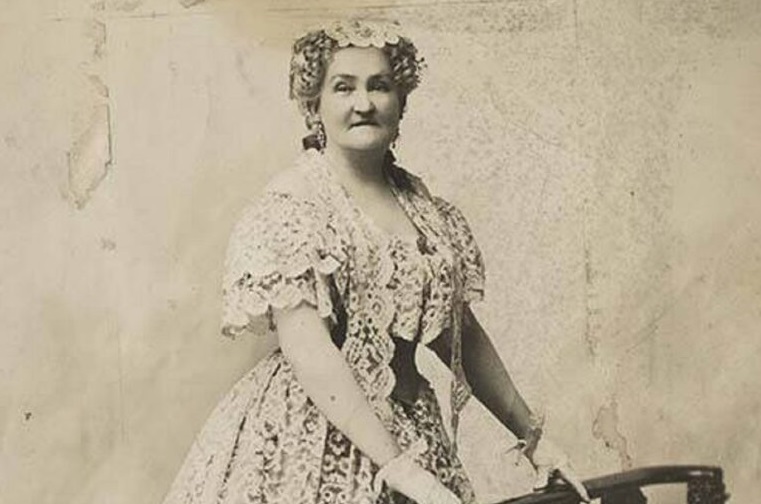 Who’s Afraid of Black History? By Henry Louis Gates Jr. / NYT
Who’s Afraid of Black History? By Henry Louis Gates Jr. / NYT
No single group or person was more pivotal to “the dissemination of the truths of Confederate history, earnestly and fully and officially,” than the historian general of the United Daughters of the Confederacy, Mildred Lewis Rutherford, of Athens, Ga. Rutherford was a descendant of a long line of slave owners.
Of the more than 25 books and pamphlets that Rutherford published, none was more important than “A Measuring Rod.” Published in 1920, her user-friendly pamphlet was meant to be the index “by which every textbook on history and literature in Southern schools should be tested by those desiring the truth.” Rutherford wished for nothing less than the power to summon the apparatus of the state to impose her strictures on our country’s narrative about the history of race and racism. Mr. DeSantis has that power and has shown his willingness to use it. And it is against this misguided display of power that those of us who cherish the freedom of inquiry at the heart of our country’s educational ideal must take a stand. Read more
Related: As red states target Black history lessons, blue states embrace them. By Hannah Natanson / Wash Post
Political / Social
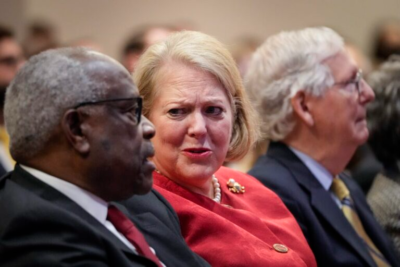 Georgia GOP senators push through installation of Clarence Thomas statue at state Capitol. By Stanley Dunlap / Georgia Recorder
Georgia GOP senators push through installation of Clarence Thomas statue at state Capitol. By Stanley Dunlap / Georgia Recorder
The Georgia Senate passed a bill Tuesday after contentious debate that would place a statue of Supreme Court Associate Justice Clarence Thomas at the state Capitol.
Atlanta Democratic Sen. Emanuel Jones called Thomas an Uncle Tom from the chamber’s floor, a derisive term for a Black person who betrays other Black people. “When we think about a person in the Black community who’s accomplished, but yet policies seek to subvert, some may even say suppress, the achievements and accomplishments of people of color; I couldn’t help but to think about that term in expressing my dissatisfaction with this particular legislation,” Jones said. Read more
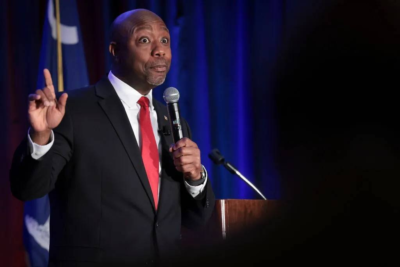 Sen. Tim Scott test drives a potential 2024 campaign message. By Allan Smith / NBC News
Sen. Tim Scott test drives a potential 2024 campaign message. By Allan Smith / NBC News
Sen. Tim Scott didn’t announce he is running for president here at the Charleston County GOP’s Black History Banquet on Thursday night. But at times, it sounded like he was already a candidate.
Scott, the first Black senator from South Carolina, spoke at length about his personal story of overcoming childhood poverty, his family’s perseverance through generations of racism and his entrance into politics, arguing that his experience is evidence that the country’s progress on racial issues outweighs modern-day racism. Scott also promoted the tenets of his agenda — promoting opportunity zones, conservative police reform, curbing federal spending and enacting school choice policies. Read more
 Nikki Haley removed the Confederate flag. She sounds different as a candidate. By Dan Balz / Wash Post
Nikki Haley removed the Confederate flag. She sounds different as a candidate. By Dan Balz / Wash Post
She inveighs against suggestions that the United States is a racist nation, using that characterization as a foil to say that she instead sees an America that is “strong and proud, not weak and woke.”
When she highlights the tragic shooting at Mother Emanuel AME Church in her opening video, she speaks of her state’s turning to its basic values and religious faith for healing. Absent is any reference to what was one of the most courageous decisions she made as governor. Political campaigns are crude instruments for conversations about issues as complicated and searing as the United States’ racial history and its racial present. Haley has seen and experienced the issue her entire life. She views herself as emblematic of the country’s openness to members of all races. Whether she will address the issue with sensitivity, as she did with the Confederate flag, or instead push political hot buttons is for her to decide. Read more
 UFOs and CRT: Republicans are in a constant state of panic about the “other.” By Chauncey Devega / Salon
UFOs and CRT: Republicans are in a constant state of panic about the “other.” By Chauncey Devega / Salon
It’s all about scaring gullible, racist white people and feeding off of that dark energy as a way of holding power
As I watched how our national UFO panic threatened to become a repeat of the Battle of Los Angeles, I immediately thought about legal scholar and attorney Derrick Bell and his provocative science fiction short story “The Space Traders.” Published in 1992, “The Space Traders” explores racism and white supremacy and the very precarious citizenship and belonging that Black people are subjected to here in the United States. The book was also made into a 33-minute movie that was part of HBO’s now cult classic film anthology “Cosmic Slop” in 1994. Read more
 More Black Families Are Considering Home-Schooling — And It Shouldn’t Be A Shock As To Why. By Sage Howard / HuffPost
More Black Families Are Considering Home-Schooling — And It Shouldn’t Be A Shock As To Why. By Sage Howard / HuffPost
As Gov. Ron DeSantis demonstrated in Florida, the influence toxic conservative politics has over public education is getting a little too real.
In the past, the concept of home-schooling was synonymous with the stress of forgoing one whole household income, and potential stigma for the kids. But now, it could be a viable alternative to public education, and should function as an equitable resource for Black families raising children in working-class households. But censorship of their curriculum disrupts this equity. Now, I feel I may have a better chance at fostering success for me and my child by juggling home-school and work. Read more
Related: More students apply to historic Black colleges and universities. By Joyce E. Davis / USA Today
 Racism takes a toll on the brain, research shows. By Richard Sima / Wash Post
Racism takes a toll on the brain, research shows. By Richard Sima / Wash Post
The chronic stress of structural racism and discrimination damages brain circuits and mental health
Related: Black cardiologists are rare, but vital for Black patients. By Adriana Diaz / CBS News
Historical / Cultural
 George Washington, Slavery, and Farming. By Rebecca Dudley / AAIHS
George Washington, Slavery, and Farming. By Rebecca Dudley / AAIHS
Slave quarters, Mount Vernon, Virginia, (Wikimedia Commons)
In Washington at the Plow: The Founding Farmer and the Question of Slavery, Bruce A. Ragsdale meticulously examines Washington’s activities in farming and managing enslaved laborers. A scholar of United States colonial and revolutionary history, Ragsdale creates a new portrait of Washington, based on the founder’s letters and personal library, that offers critical insight into Washington’s vision as an agriculturalist and his motivation in liberating, upon his death in 1799 and seemingly out of nowhere, the 123 people he held in bondage. Read more
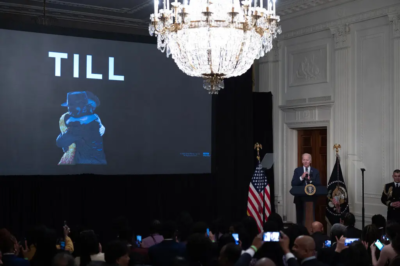 From ‘Birth of a Nation’ to ‘Till’: Confronting Racism in the White House Screening Room.
From ‘Birth of a Nation’ to ‘Till’: Confronting Racism in the White House Screening Room.
In 1915, Woodrow Wilson gathered a small crowd in the East Room of the White House to show “The Birth of a Nation,” a film celebrating the Ku Klux Klan. More than a century later, in the same room, President Biden on Thursday convened families of people killed in hate crimes for a screening of the movie “Till,” about Emmett Till, the 14-year-old Black boy whose murder in 1955 galvanized the civil rights movement. “History matters,” Mr. Biden said before the movie began, in front of an audience that included members of Emmett’s family, student groups and community activists. “We should know everything about our history, and that’s what great nations do.” Read more
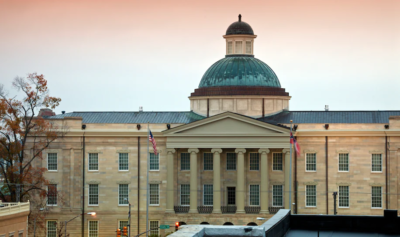 The ‘Mississippi Plan’ to keep Blacks from voting in 1890: ‘We came here to exclude the Negro.’ By Ronald G. Shafer / Wash Post
The ‘Mississippi Plan’ to keep Blacks from voting in 1890: ‘We came here to exclude the Negro.’ By Ronald G. Shafer / Wash Post
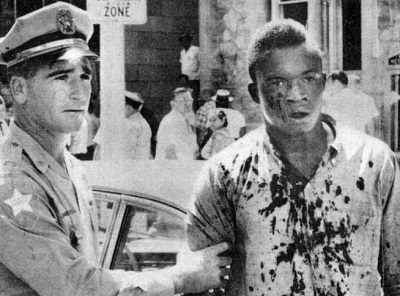 ‘Ax Handle Saturday’: The Klan’s vicious attack on Black protesters in Florida 60 years ago. By Sydney Trent / Wash Post
‘Ax Handle Saturday’: The Klan’s vicious attack on Black protesters in Florida 60 years ago. By Sydney Trent / Wash Post
A Jacksonville police officer stands with Charles Griffin after he was attacked on Aug. 27, 1960, during a lunch counter protest by civil rights activists in Florida. (Florida Historical Society)
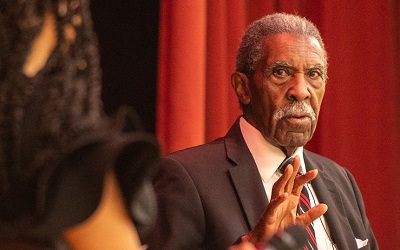 Racism denied Auburn’s first Black student a master’s degree. Then, at 86, he returned. By DeNeen L. Brown / Wash Post
Racism denied Auburn’s first Black student a master’s degree. Then, at 86, he returned. By DeNeen L. Brown / Wash Post
Harold A. Franklin, the first African American student admitted to Auburn University, speaks at a Black History Month event on the campus in February. (Jonah Enfinger/Auburn University Photographic Services)
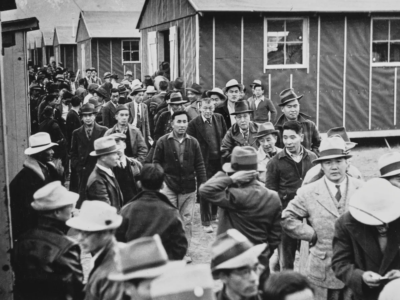 Inside the project to honor Japanese-American history. By Emilie Ikeda / Today
Inside the project to honor Japanese-American history. By Emilie Ikeda / Today
Japanese interment camp. c 1943
Eighty-one years ago, Executive Order 9066 authorized the incarceration of more than 125,000 people of Japanese ancestry living in the United States during World War II. Now, for the first time, researchers have compiled all of their names in one place, giving decedents a chance to honor their family history. NBC’s Emilie Ikeda reports for TODAY. Watch here
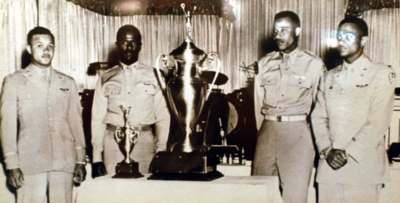 73 years after winning first ‘Top Gun’ competition, Black pilots are honored. By Dave Kindy / Wash Post
73 years after winning first ‘Top Gun’ competition, Black pilots are honored. By Dave Kindy / Wash Post
Pilots of the 332nd Fighter Wing who won first place for propeller-driven aircraft in a fighter gunnery meet held in Las Vegas. From left, Capt. Alva Temple, 1st Lt. James Harvey III, 1st. Lt. Harry Stewart and alternate 1st Lt. Halbert Alexander. (U.S. Air Force)
In the spring of 1949, the 332nd Fighter Group — the unit of the Tuskegee Airmen — was in Las Vegas for the inaugural Continental Air Gunnery Meet, the U.S. Air Force equivalent of the U.S. Navy’s “Top Gun” school, which would be started 20 years later. This all-Black fighter and bomber group, which trained in Tuskegee, Ala., was one of the most decorated squadrons in the segregated military during World War II. After working day and night to keep the 332nd planes flying during the competition, a few members of the ground crew decided to blow off steam at the famous Flamingo Hotel. They didn’t get far. Security guards intercepted the men as they entered and ordered them to leave. The casino was for “Whites only,” they were told. Read more
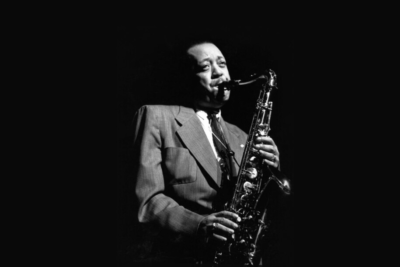 Black Music Sunday: On President’s Day, Lester Young will always be ‘The Prez’ of jazz. By Denise Oliver Velez / Daily Kos
Black Music Sunday: On President’s Day, Lester Young will always be ‘The Prez’ of jazz. By Denise Oliver Velez / Daily Kos
Lester Willis Young, one of the most influential musicians in the history of jazz, was born on August 27, 1909, in Woodville, Mississippi.
In the jazz world we have had a Duke, a Count, and a King, but there is only one artist who was given the moniker of president, often shortened to “Pres” or “The Prez.” That man was clarinet and tenor saxophone player Lester Young. Jazz vocal legend Billie Holiday, who Lester Young dubbed “Lady Day,” was quoted about him and the source of his nickname: “In this country kings or dukes don’t amount to nothing. The greatest man around then was Franklin D. Roosevelt, and he was the president; so I started calling Lester the President. It got shortened to Pres.” Read and listen here
Sports
 Marvin Gaye’s iconic NBA All-Star Game national anthem: ‘He turned that thing into his own.’ David Aldridge and Marcus Thompson II / The Atheletic
Marvin Gaye’s iconic NBA All-Star Game national anthem: ‘He turned that thing into his own.’ David Aldridge and Marcus Thompson II / The Atheletic
For one afternoon, America’s anointed theme song had a suede soul, velvety enough to be simultaneously sexy and spiritual.
For one afternoon, patriotism masqueraded as a Motown kind of cool. The Forum in Inglewood, Calif., was graced by a superstar’s serenade, stirring together hope and love, resilience and confidence, into a concoction delightful enough to be served on the rocks. For one afternoon, the time set aside to honor America became a historic homage to the rhythm and blues of Blackness, a tribute to the resilient genius of African American culture. And after that afternoon in Inglewood, neither “The Star-Spangled Banner” nor the NBA would ever be the same. Read more and listen here
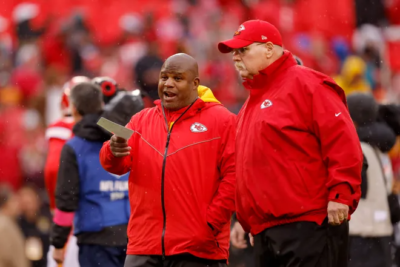 Eric Bieniemy going to Washington Commanders is embarrassing for NFL By Mike Freeman / USA Today
Eric Bieniemy going to Washington Commanders is embarrassing for NFL By Mike Freeman / USA Today
What I want to do is focus on the bottom line. It is sad, and pathetic, that Bieniemy has to take this job. It is humiliating for him and embarrassing for the NFL.
On paper, Eric Bieniemy taking the Washington Commanders offensive coordinator position makes sense. He’ll call plays for the first time in his NFL coaching career and it will eradicate excuse No. 1.7 million on why he hasn’t been hired as a head coach. Of all the excuses used to not hire Bieniemy – he doesn’t interview well, Andy Reid is the true offensive genius. Bieniemy has coached in Super Bowls and he was Mahomes’ coordinator. In almost all situations, the offensive coordinator gets a nice share of credit for these things. But in the NFL coaching world, credit isn’t always given when you’re Black. Read more
Related: A lost generation of Black coaching talent. By Dave Sheinin / Wash Post
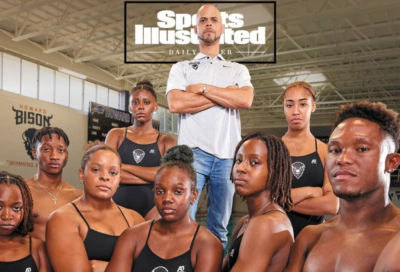 Howard University’s All-Black Swim Team Makes The Cover Of Sports Illustrated, A First For The Magazine. By Stephanie Holland / The Root
Howard University’s All-Black Swim Team Makes The Cover Of Sports Illustrated, A First For The Magazine. By Stephanie Holland / The Root
The program makes history as the first all-Black swim team to appear on the Sports Illustrated’s cover.
For HBCU athletic programs, it’s a constant struggle to even the playing field with their counterparts at predominantly white institutions. It’s a non-stop fight for recognition, money and top-level recruits. Now, Howard University is being recognized with an achievement usually reserved for big-money college basketball and football programs: its Swim and Dive Team is the first all-Black swim team to appear on the cover of Sports Illustrated. Read more
 Tiger Woods Is Back. He’s Still a Work in Progress. By Alan Blinder / NYT
Tiger Woods Is Back. He’s Still a Work in Progress. By Alan Blinder / NYT
Woods shot a two-under-par 69 on Thursday and a 74 on Friday at the Genesis Invitational. Every stroke was research for the bigger ambitions that still linger.
The world’s 1,294th-ranked golfer arrived at the tee box on Thursday afternoon. The No. 2 player, Rory McIlroy, was there, too. So was Justin Thomas, ranked seventh. But the 47-year-old man wedged between William Nygard and Marcos Montenegro in the Official World Golf Ranking still believed, however fantastically, that he could win the Genesis Invitational, a tournament he had never conquered. Less than two years ago, the notion of Woods walking a course with Thomas, or anyone else, in PGA Tour competition seemed distant. Professional golf does not ordinarily pair well with a quick recovery from a car wreck, particularly a wreck that nearly cost one of the sport’s finest players a leg, and the physical toll of competition has appeared immense. Read more
Site Information
Articles appearing in the Digest are archived on our home page. And at the top of this page register your email to receive notification of new editions of Race Inquiry Digest.
Click here for earlier Digests. The site is searchable by name or topic. See “search” at the top of this page.
About Race Inquiry and Race Inquiry Digest. The Digest is published on Mondays and Thursdays.
Use the customized buttons below to share the Digest in an email, or post to your Facebook, Linkedin or Twitter accounts.